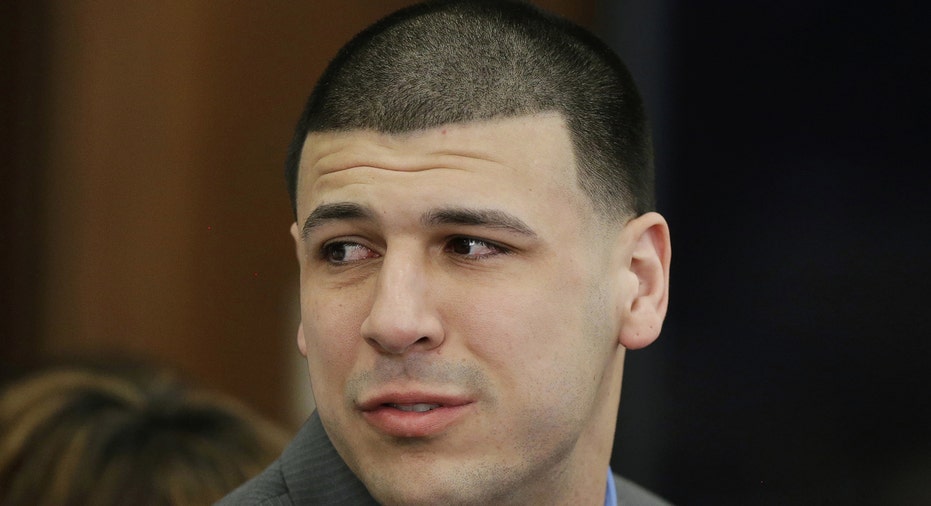Aaron Hernandez Unlikely to Recover Millions From Patriots, NFL: Expert

Even after a Massachusetts judge erased his murder conviction on Tuesday, the estate of former New England Patriots star Aaron Hernandez does not have a strong argument to pursue the $3.25 million bonus payment his former employer withheld after his arrest, a legal expert told FOX Business.
Judge Susan Garsh granted a request to void Hernandez’s conviction for the 2013 murder of Odin Lloyd because the former NFL standout died by suicide before his appeal could be completed. Some experts suggested that a vacated conviction would allow the former tight-end’s family to pursue compensation from the Patriots and the NFL, because the charge would no longer appear on his record.
However, the NFL’s collective-bargaining agreement, not a criminal court, is the standard by which the Patriots are required to operate. The five-year, $40 million contract Hernandez signed before his arrest almost certainly included a conduct clause that would allow the franchise to withhold payment of salary or bonuses in the event of wrongdoing, according to Rosanna Cavallaro, a professor of law at Suffolk University in Massachusetts.
“[The Patriots] can decide, according to their own lines, whether someone has violated their contract, so it’s not obvious to me that if you vacate the criminal judgment, now the NFL has to go back to treating him like someone whose contract is valid,” Cavallaro told FOX Business. “I just don’t see that. There’s a very good argument from the NFL or the Patriots’ perspective that it’s the conduct that we’re interested in, not that adjudication of the conduct.”
Judge Garsh erased Hernandez’s conviction due to a longstanding Massachusetts legal tenant called “abatement ab initio.” The judge said the legal precedent was binding. Prosecutors had argued that Hernandez’s death was not grounds to void his sentence because it occurred as a result of a “conscious, deliberate and voluntary act.”
“From a legal standpoint, the next step is an appeal by the DA, which he announced today that he would pursue. Given the precedent in Massachusetts, it is difficult to see Judge Garsh's decision today being overturned,” said Dan Werly, a Nashville-based sports lawyer and founder of “The White Bronco” sports law blog.
According to Cavallaro, any attempt by Hernandez’s estate to recover money from the Patriots or a league pension from the NFL would occur through discussions between the NFL and its players union. If the case ever made it to civil court, it would likely unfold similarly to Tom Brady’s legal battle with the NFL during the “Deflategate” saga, when a court ultimately ruled on whether the NFL Commissioner Roger Goodell was within his right to discipline Brady under the CBA’s terms.
Even with Hernandez’s conviction expunged from his record, his arrest alone would likely give the Patriots and the NFL all the evidence they need to justify withholding payment from his family.
“The arrest and the facts surrounding the arrest, the facts as presented to a criminal jury – that should give the NFL or the team, whoever is under the obligation to pay him, plenty of ammunition to say ‘we don’t have to pay you anymore,’” Cavallaro said.
However, the widely-held notion that the abatement could help protect Hernandez’s remaining financial assets from civil lawsuits is accurate. Without a criminal conviction, attorneys for Lloyd’s family – or any other prospective plaintiffs – may have to go “back to square one” and prove that Hernandez is liable for Lloyd’s death to receive damages, Cavallaro said. The burden of proof is lower in civil court than it is in criminal court, but a favorable ruling is not a sure thing.
The value of Hernandez’s possessions remains a matter of debate. The Boston Herald reported last month that his estate was essentially worthless, with his North Attleboro mansion the only remaining asset. Last month, an offer was made on the $1.3 million home according to a family attorney, CBS Boston reported.
“There’s a symbolic value to getting a judgment, but if there’s nothing there, [there are] questions whether the Lloyd family would want to take the time and expense to go through the process of proof when there’s nothing there,” Cavallaro said.



















